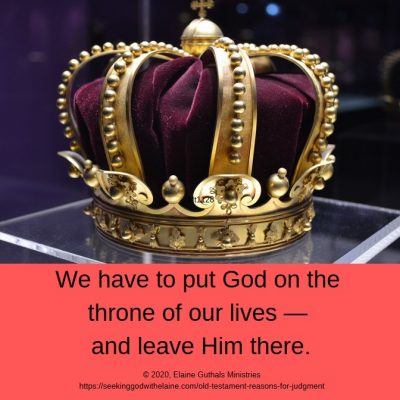Since we learn from the past, what can we learn from the Old Testament about reasons for God’s wrath that brought His judgment? This devotion looks at five different instances – that have a common trigger.
Nuggets
- The Antichrist will be a leader – but the wrong leader.
- Judah started worshiping the false gods of the region, which was the wrong worship.
- We can be doing what God wants but still be doing the wrong actions.
- God didn’t want the Israelites to compromise the do’s and don’ts – that would be the wrong influence.
- We need to make sure we possess the assurance that Jesus is our Savior and Redeemer, not the wrong possessions that money can buy.
Devotions in the What I Believe series
Devotions in the End Times category
Judgment Day Focus
Old Testament Reasons for Judgment

Is it just me, or have you associated the wrath of God mainly with the Old Testament? It just seems to me that the “crime and punishment” episodes happened a lot more frequently in the Old Testament.
Maybe it all boils down to the Wilderness Wanderer era. They got off on the wrong foot with God, and it went downhill from there.
I think we can learn a lot about being obedient to God if we look at some of the episodes where His wrath was kindled. That should help us prepare for the final judgment. Let’s take a look.
Let's Put It into Context
The Holman Bible Dictionary defines judgment day as “time of God’s punishment and refining of the evil in the world, especially of the final, history-ending time of eternal judgment.”
Resource
Wrong Leader
“As I was watching, this horn waged war against the holy ones and was prevailing over them until the Ancient of Days arrived and a judgment was given in favor of the holy ones of the Most High, for the time had come, and the holy ones took possession of the kingdom” (Dan. 7: 21-22 CSB)
Pastor Chad preached on this passage Sunday. The passage is the recount of Daniel’s dream. It gave a preview of future events.
The horn represents the Antichrist. The Holman Bible Dictionary defines Antichrist as “… a particular individual or a group of people who oppose God and His purpose.” The Antichrist will be a leader – but the wrong leader.
What Daniel was describing was the fall of the Antichrist. Yes, that is a good thing, but before that happens many people will be led away from God. That is bad.
Leaders are very important. They provide an organization to life that is essential.
Unfortunately, not all leaders are godly leaders. When we are choosing our leaders, we need to pick men and women who love the Lord with all their hearts. They need to try to follow God’s laws and commandments.
It they, like the Antichrist, give their allegiance to Satan, God’s wrath will be kindled. Exodus 20: 3 says, “You shall have no other gods before me” (ESV). These gods were personifications of a symbol.
It doesn’t say, “I would rather you didn’t give your faithfulness to other gods.” “It really isn’t a good idea.”
The commandment flat out says don’t. God wants us to follow only Him.
Pastor Chad pointed something out Sunday. “I watched, then, because of the sound of the arrogant words the horn was speaking. As I continued watching, the beast was killed and its body destroyed and given over to the burning fire” (Dan. 7: 11 CSB). All the way up to the time he and Satan are thrown into the fire, the Antichrist is going to keep jawing, spewing out lies.
Some people think they can talk their way out of anything. It isn’t going to work with God. Right is right, and wrong is wrong with God. If it does not glorify Him, it is wrong.

Wrong Worship
“However, after Jehoiada died, the rulers of Judah came and paid homage to the king. Then the king listened to them, and they abandoned the temple of the Lord, the God of their ancestors, and served the Asherah poles and the idols. So there was wrath against Judah and Jerusalem for this guilt of theirs” (II Chron. 24: 17-18 CSB)
Jehoiada was the high priest, and Joash was the king. Things went well for a while. “Throughout the time of the priest Jehoiada, Joash did what was right in the Lord’s sight” (II Chron. 24: 2 CSB).
Things went downhill quickly when Jehoiada died, though. Judah started worshiping the false gods of the region, which was the wrong worship.
Our relationship with God is an individual thing. Joash’s relationship was on Joash alone. Jehoiada may have been an upright, righteous man.
That didn’t make Joash upright and righteous. Joash had to be rooted and grounded for himself.
What happened before that? Was Joash just going through the motions? Did he think he would reap the benefits but not really buy into a relationship with the Sovereign Lord? Was he just lost without Jehoiada to advise him?
Whatever the reason, the result was catastrophic. According to the Holman Bible Dictionary, Asherah was “a fertility goddess, the mother of Baal, whose worship was concentrated in Syria and Canaan and the wooden object that represented her.”
It doesn’t say how much talking the rulers had to do to talk Joash into worshiping something other than God. It doesn’t really matter. They abandoned God.
What may have seemed harmless wasn’t. “You shall have no other gods before me” (Ex. 20: 3 ESV). Not Satan. Not a Satan substitute.
We’ve talked about idols before. An idol is a “physical or material image or form representing a reality or being considered divine and thus an object of worship.” By worshiping it, we are saying it is holy presence, in control of us, and worthy of our reverence.
God specifically forbids us to worship idols. “Do not make an idol for yourself, whether in the shape of anything in the heavens above or on the earth below or in the waters under the earth” (Ex. 20: 4 CSB).
Wrong Actions
“Once again the anger of the LORD burned against Israel, and he caused David to harm them by taking a census. “Go and count the people of Israel and Judah,” the LORD told him” (II Sam. 24: 1 NLT)
This is kind of a chicken-and-egg situation. God was angry, so He had David conduct a census — but the way that David did it angered God. (This is the same census described in First Chronicles 27: 1-34.)
According to Dale, David wanted to know the strength of his military. Whitfield thought it was so he could leave a strong army for when Solomon took over. The problem was he not only didn’t consult God on how to conduct the census, the price of a sin offering per person was not collected.
Oh, man. Doesn’t that bite? We can be doing what God wants but still be doing the wrong actions.
No, God isn’t trying to purposefully trip us up. He wants to make sure we are focusing on Him. He doesn’t want divided attention. He doesn’t want us doing it ourselves.
As a mom, I can see trying to get all of our water fowl in a linear position for kiddos. Most days, my little fluff balls aren’t in the same pond, let alone ducks in a row. So, I can see trying to get organized so Adam has an easier time if something happened to me.
We have to put God on the throne of our lives — and leave Him there. We can’t keep trying to knock Him off and climb on ourselves.

Wrong Influence
“Let our leaders represent the entire assembly. Then let all those in our towns who have married foreign women come at appointed times, together with the elders and judges of each town, in order to avert the fierce anger of our God concerning this matter” (Ezra 10: 14 CSB)
The Israelites were commanded to not intermarry with those in the Promised Land. “When the Lord your God brings you into the land you are entering to possess, and he drives out many nations before you … and when the Lord your God delivers them over to you and you defeat them, you must completely destroy them. Make no treaty with them and show them no mercy. You must not intermarry with them, and you must not give your daughters to their sons or take their daughters for your sons, because they will turn your sons away from me to worship other gods. Then the Lord’s anger will burn against you, and he will swiftly destroy you. Instead, this is what you are to do to them: tear down their altars, smash their sacred pillars, cut down their Asherah poles, and burn their carved images. For you are a holy people belonging to the Lord your God. The Lord your God has chosen you to be his own possession out of all the peoples on the face of the earth” (Deut. 7: 1-6 CSB).
Relationships demand compromise. God didn’t want the Israelites to compromise the do’s and don’ts – that would be the wrong influence.
Wrong Possessions
“Their silver and their gold will be unable to rescue them on the day of the Lord’s wrath. The whole earth will be consumed by the fire of his jealousy, for he will make a complete, yes, a horrifying end of all the inhabitants of the earth” (Zeph. 1: 18 CSB)
We put a lot of emphasis on how much is in our bank accounts. Part of it is the status of having the money. Part of it is what we buy with the money.
Yep, that all translates into status.
True, a part of it is provision. Many people live paycheck to paycheck. If the battery dies in the car or the refrigerator dies, many would be sunk.
I remember when I left my husband, I thought I would be okay because I had a good-paying job. Then I didn’t have that job. I had to remember — learn — to rely on God.
We need to make sure we possess the assurance that Jesus is our Savior and Redeemer, not the wrong possessions that money can buy.
Making the Connections
Do you see a pattern forming? We start relying on ourselves — we take God of the throne of our hearts — and God gets angry and brings judgment.
God is a hands-on God. He doesn’t want us to make a profession of faith and never contact Him again. He wants us to be firmly on the sanctification road. He wants us to let Him provide for us.
We need to be molding our character to be more like His. In order to do that, we have to have consistent contact with Him.
Making the Connections to Self-Discipline
We’ve been asking these questions all along so we can prepare for when we are asked. Here is the worksheet again. How would you describe what triggers God’s wrath?
- What does the Scriptures say?
- What do I believe?
- Why do I believe the same/differently than the Scriptures?
- What are the talking points when witnessing to a non-believer?
Related Links
I have created a worksheet of the questions above. Click on the button below to access it.
How Do We Apply This?
We will not incite God’s wrath when we are obeying Him. That means we need to know what His laws and commandments are. To find out what those are, we need to seek God.
Searching for and Seeking God
Hearing His Word (Rom. 10: 17).
Reading His Word (Rev. 1: 3).
Praying to Him (Heb. 4: 16).
Studying His Word (Ac. 17: 11).
Meditating on His Word (Ps. 1: 1-2).
Memorizing His Word (Ps. 119: 11).
We need to listen to the promptings of the Holy Spirit. But we can’t stop there. Whatever the Holy Spirit tells us to do, we need to do. We can’t go out on our own like David did.
Most of all, we need to be sincere in our desire to serve God and follow His Will. He doesn’t expect us to be perfect — He expects us to be working toward being perfect.
Father God. We do not want to disobey You. We know we will because we are still in these sinful bodies. We do not want to incite Your wrath. We want to grow in grace and knowledge of You. We want to imitate You. Help us to listen to the promptings of the Holy Spirit so that we can live in Your Will. Amen.
What do you think?
Leave me a comment below (about this or anything else) or head over to my Facebook group for some interactive discussion.
If you don’t understand something and would like further clarification, please contact me.
If you have not signed up for the email daily or weekly providing the link to the devotions and the newsletter, do so below.
If God has used this devotion to speak with you, consider sharing it on social media.
Pingback: What Do You Mean All Disciples Won’t Get into Heaven? – Seeking God with Elaine
Pingback: Will Disciples Have a Judgment Day? – Seeking God with Elaine
Pingback: Will There Be a Judgment Day? – Seeking God with Elaine
Pingback: Ordering Our Evil Thoughts through Scriptures – Seeking God with Elaine